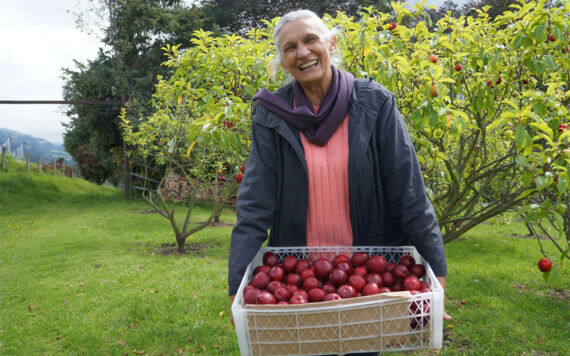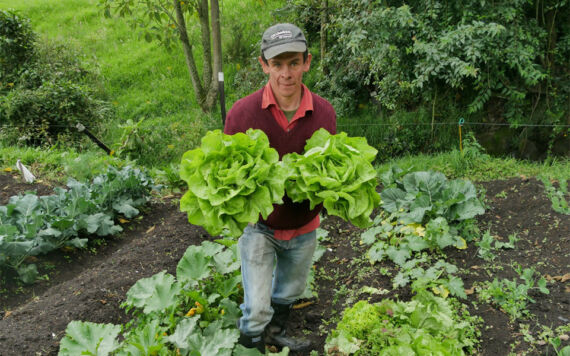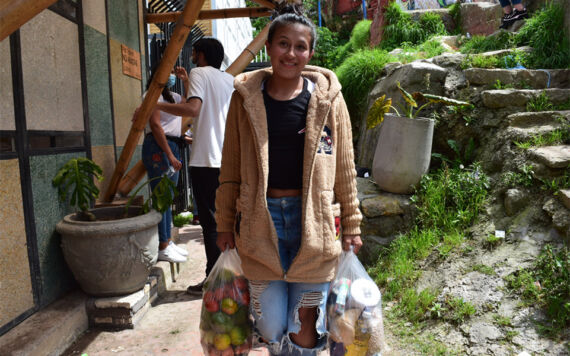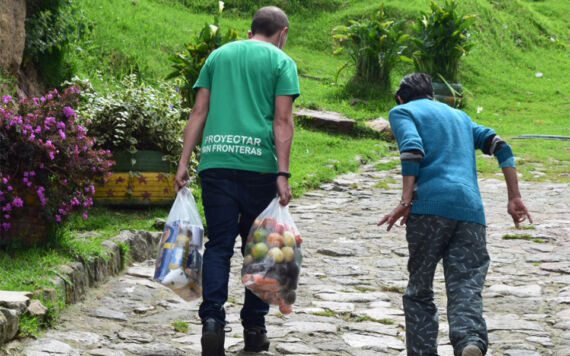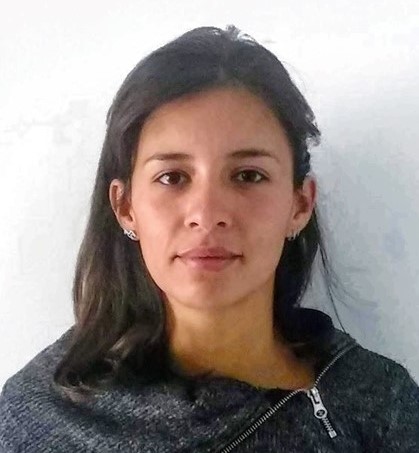| Project Name | Improving Smallholder Producers and Urban Vulnerable Population’s Resilience through Agroecological Supply Chains in the Region of Bogota |
| Commisioned by | German Federal Ministry for Economic Cooperation and Development (BMZ) |
| Country | Colombia |
| Implementing Organisation | Proyectar Sin Fronteras (PSF) – ong-psf.org |
| Duration | November 2021 – August 2023 |
The Challenge
Negavite Effects on the Agricultural Sector: The COVID-19 pandemic has exacerbated insecurity and extreme poverty in Colombia. The agricultural sector in particular was negatively affected. In 2020, Columbian farmers had to pay 30 % higher prices for agricultural inputs. 80 % of farmers are affected, especially those active in lifestock and horticultural areas.
Healthy Nutrition: Even before the crisis, unbalanced diets were common. Most Colombians did not consume fruits, vegetables, or greens on a daily basis due to lack of knowledge about healthy nutrition or financial means.
Interrelations: Problems caused by conventional agriculture, such as environmental degradation, low incomes for producers, and the lack of sound marketing strategies worsen the economic situation of the rural population.
The Objective
The project consolidates a solidarity supply chain and promotes a more equitable and environmentally friendly food system for both producers and consumers. Farmers increase their customer base. At the same time, the project contributes to the food resilience of urban populations in fragile conditions.
The Target Group
The project targets smallholder farmers, giving priority to those who are more vulnerable and have potential for certification and adaption.
The beneficiaries live in districts of Bogota with high social and food insecurity. They get trained on food security and resilience with organic produce.
Priority is given to informal workers, Colombian women as heads of households who do not have the possibility to work and Venezuelan refugees who have difficulty meeting their basic needs.
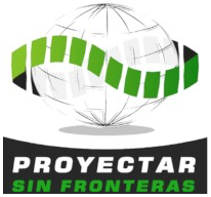
About Proyectar Sin Fronteras (PSF)
PSF was founded in 2006 in order to promote international solidarity projects. The first projects started at the same year in the area of Santa Rosa in Bogota, Colombia. Today, PSF is present in Brazil, Colombia, India and Peru.
PSF’s mission is to develop and promote participatory projects with high social impact, which reduce economic vulnerability through innovation in social finance.
Website: ong-psf.org
The Approach
Network of Producers: PSF already supports a network of 84 farmers located in 12 municipalities in the Bogota region who apply local standards for agroecological practices. The project will strengthen and expand this network by including 25 smallholder farmers from four additional municipalities.
Capacity Building in Agroecology: The project team will assess the extent to which farmers comply with agroecological standards. Based on the diagnosis, the producers establish an
improvement plan to meet these standards. They will attend a training in agroecology and learn the required skills and practices. The project also supports the farmers to install tailored technologies. In this way, they improve the efficiency of their farming.
Increase of Income: Through marketing and communication, new customers in Bogota interested in buying agroecological produce join the network. As a result, the farmers are becoming more independent in their production methods, reducing their costs of production and increasing their income.
Targeting Vulnerable Communities: The project also trains vulnerable people in low-income neighbourhoods in the Capital District of Bogota. Participants learn how to grow seeds and plants and how to eat healthier with the certified farmers’ produce. The project also includes a menstruation education component
Achieved Results
- 25 small farmers practice certified agro-economic agriculture and cultivate their fields in a more productive and ecological way
- 2400 people have the opportunity to eat healthier and have information about balanced
nutrition - 600 foodbaskets were distributed to vulnerable families
- 110 women were educated about menstrual health
Andrea Gómez
Project Coordinator
Proyectar Sin Fronteras
In the context of sustainable development, what do you consider the greatest challenge that you help to overcome in your country? What is special about your project and approach, with regard to the context in which it is located?
PSF addresses a variety of challenges in both urban and rural areas. First, by reducing gaps between rural and urban populations that prevent people from accessing sufficient and nutritious food, PSF contributes to improve food security for both rural and urban people. Second, by promoting agroecology practices, PSF addresses all issues related to responsible and adaptive production, at a time when climate change is making food production more difficult. In this way, it also contributes to the protection of strategic ecosystems and the environmental services they provide.
Let’s get specific: What was your most significant project success? What was especially important/notable? What are you particularly proud of having achieved?
Our most significant project success is to be able to unite such a diverse community, where indigenous and afrodescendants communities and displaced peasants converge, to build a community garden that will provide them with food in the long term. In the development of this garden, we recovered more than 600 square meters that were used as a garbage dump.
What have you learned and what experiences would you like to share with like-minded actors/practitioners?
In the development of the project we learned that it is possible to generate a community of connected, active and participatory agroecological farmers, able to exchange knowledge with other actors in the network and implement them in the improvement of their own farms. This is essential for the sustainability of the project and the continuity of agroecological practices in the region.


